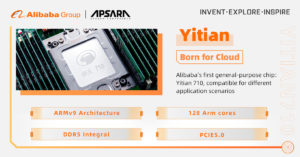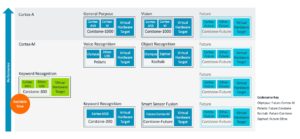
EDACafe Editorial Roberto Frazzoli
Roberto Frazzoli is a contributing editor to EDACafe. His interests as a technology journalist focus on the semiconductor ecosystem in all its aspects. Roberto started covering electronics in 1987. His weekly contribution to EDACafe started in early 2019. TSMC and Samsung Foundry roadmaps; new Alibaba processors; Arm Virtual Hardware for IoTOctober 25th, 2021 by Roberto Frazzoli
Chips built using 2-nanometer processes will enter volume production in 2025; this, at least, is what we can expect based on the roadmap updates recently provided by both Samsung Foundry and TSMC. For the 2-nanometer node, the South Korean company will adopt its version of the gate-all-around transistor architecture; TSMC is also considering GAA, but has not committed to it yet. More news this week include a 60-billion transistor chip from Alibaba, and a multi-pronged Arm initiative meant to boost the IoT market. But first, a couple of EDA updates. Ansys adds a charging/discharging simulation solution Ansys has added EMA3D Charge to its simulation solution portfolio. Developed by Colorado-based Electro Magnetic Applications company, EMA3D Charge enhances predictive accuracy for charging and discharging events that can have an impact on safety for a wide range of electric/electronics products. Leveraging Ansys SpaceClaim, the solution combines CAD import, design and simplification, simulation setup and meshing, and result generalization and visualization into one solver technology. According to Ansys, EMA3D Charge fills a need in a marketplace in which no other simulation product exists, providing a unified end-to-end workflow. Cadence to speed up ISO 26262 and IEC 61508 certification Cadence has announced the Cadence Safety Solution, a new offering featuring integrated analog and digital safety flows and engines for faster ISO 26262 and IEC 61508 certification. Targeting safety-critical applications – such as automotive and aerospace – the solution includes a new failure modes, effects, and diagnostic analysis (FMEDA) offering called the Cadence Midas Safety Platform, allowing to perform FMEDA-driven analog and digital verification of safety-critical semiconductors.
Foundry roadmap updates: Samsung, TSMC Samsung Foundry disclosed some updates on its roadmap on occasion of the company’s 5th annual Samsung Foundry Forum, held on October 7. The company is scheduled to start producing its first 3nm-based chip designs in the first half of 2022, while its second generation of 3nm is expected in 2023. Newly added to Samsung’s technology roadmap, the 2nm process node with MBCFET is in the early stages of development with mass production in 2025. MBCFET (Multi-Bridge-Channel FET) is Samsung’s own version of the gate-all-around transistor architecture. According to the company, MBCFET will allow up to 35 percent decrease in area, 30 percent higher performance or 50 percent lower power consumption compared to the 5nm process. In addition to PPA improvements, 3nm’s logic yield is approaching a similar level to the 4nm process, which is currently in mass production. TSMC provided some details on its roadmap during the Q3 2021 earnings call which took place on October 14. The company’s CEO, C.C. Wei, said that “TSMC’s N3 technology will use FinFET transistor structure to deliver the best technology maturity, performance and cost for our customers. Our N3 technology development is on track. We have developed complete platform support for both HPC and smartphone applications. N3 risk production is scheduled in 2021, and production will start in second half of 2022. We continue to see a high level of customer engagement at N3 and expect more new tapeouts for N3 for the first year as compared with N5. We also introduced N3E – he continued – as an extension of our N3 family. N3E will feature improved manufacturing process window with better performance, power and yield. Volume production of N3E is scheduled for one year after N3.” Wei spoke about the 2-nanometer node answering a question from a financial analyst. He said that “in our 2-nanometer technology, the density and performance will be the most competitive in 2025. And of course, I can also share with you that the gate-all-around structure is being considered, although I’m not ready to release more information about it.”  Left: Dr. Siyoung Choi, President and Head of Foundry Business at Samsung Electronics (Credit: Samsung) New Alibaba server processors Alibaba Cloud has unveiled a new in-house processor design for use in its data centers. The server chips, named Yitian 710, are custom-built by Alibaba Group’s chip development business, T-Head. Powered by these chips, Alibaba Cloud also announced the development of its proprietary servers, called Panjiu. Built upon 5nm process technology, Yitian 710 is powered by 128 Arm cores with 3.2GHz top clock speed. Each processor chip has 60 billion integrated transistors. Yitian 710 is the first server processor that is compatible with the latest Armv9 architecture and includes 8 DDR5 channels and 96-lane PCIe 5.0. Yitian 710 achieved a score of 440 in SPECint2017; according to Alibaba, this result surpasses that of the current state-of-the-art Arm server processor by 20% in performance and 50% in energy efficiency. The company has also announced that it will open the source code of the XuanTie IP core series, Alibaba’s Risc-V- based processors, making them available on Github and Open Chip Community. XuanTie-related software stacks – which support multiple operating systems, including Linux, Android, RTOS and Alibaba’s own AliOS – will also be opened. Arm to enable software-hardware co-development for IoT applications Under the umbrella name “Arm Total Solutions for IoT”, Arm has introduced a new offering aimed at speeding up the development of IoT products. A key element of the new offering is Arm Virtual Hardware, a cloud-based virtual model of the Arm Corstone subsystem – available on AWS Marketplace – that enables software development without the need for physical silicon. According to the company, Arm Virtual Hardware brings modern agile software development methodologies like CI/CD, DevOps and MLOps to IoT and embedded platforms. With accurate models of Arm-based SoCs providing mechanisms for simulating memory, peripherals and more, development and testing of software is now possible before silicon availability. Arm expect this to ultimately reduce a typical product design cycle from an average of five years to three years. Arm Total Solutions for IoT also offers resources for specific use-cases, including hardware IP, software, machine learning models. A new initiative called Project Centauri will deliver a set of device and platform standards, as well as reference implementations for device boot, security and cloud integration. The Project Centauri APIs include support for PSA Certified and Open-CMSIS-CDI, a standard cloud-to-device specification. Arm Virtual Hardware GitHub page is here. Acquisitions Canadian reverse-engineering firm TechInsights has acquired The Linley Group, a technology analysis firm based in Mountain View, CA, known for its publications and conferences on microprocessors and AI chips. Last August, TechInsights acquired market research firm VLSI Research (San Jose, CA). Sweden-based Sivers Semiconductors has entered into an agreement to acquire 100 per cent of the share capital of MixComm, a US-based mmWave challenger fabless semiconductor company. According to Sivers, following completion, the enlarged group will be a global leader in 5G mmWave semiconductors, with a broad IP portfolio of radio frequency/beam forming integrated circuits chipsets in a wide variety of technologies, including SiGe and RF-SOI. The acquisition also enables the combined businesses to bring MixComm’s Antenna-in-Package technology to all mmWave applications. Events The AI Summit Silicon Valley and IoT World Silicon Valley will take place as in-person events on November 3 and 4 in Santa Clara, CA. The IEEE International Conference on Rebooting Computing will be held virtually from 30 November to 2 December. |
|
|
|||||
|
|
|||||
|
|||||








